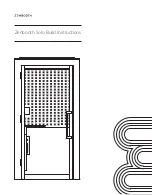
Introduction
1
The Southwire 41150S Voltage Tester provides a simple and fast
method of testing AC and DC voltage up to 240 volts. It also
tests GFCI protected outlets. This meter is fully tested and,
with proper use, will provide many years of reliable service.
WARNINGS
• Read, understand and follow the Safety Rules and Operating
Instructions in this manual before using this instrument.
• The tester’s safety features may not protect the user if not
used in accordance to the manufacturer’s instructions.
• Keep fingers away from the metal probe tips when taking
measurements.
• Comply with all safety codes. Use approved personal
protective equipment when working near live electrical
circuits - particularly with regard to arc-flash potential.
• Use caution on live circuits. Voltages above 30V AC RMS,
42V AC peak, or 60V DC pose a shock hazard.
• Do not use if the instrument or test leads appear damaged.
• Verify tester’s operation by measuring a known voltage.
• Do not use the tester in wet or damp environments or during
electrical storms.
• Do not use the tester near explosive vapors, dust or gasses.
• Do not use the tester if it operates incorrectly.
Protection may be compromised.
• Do not apply voltage that exceeds the tester’s maximum
rated input limits.
2
Input Limits
Function
Maximum Input
Voltage DC, Voltage AC
250V
International Safety Symbols
Potential danger. Indicates the user must refer to the
manual for important safety information
Indicates hazardous voltages may be present
Equipment is protected by double or reinforced insulation
Indicates the terminal(s) so marked must not be connected
to a circuit where the voltage with respect to earth ground
exceeds the maximum safety rating of the meter
Indicates the terminal(s) so marked may be
subjected to hazardous voltages.
MAX
250V
Brief Description
Typical Applications
Category
Rating
Single phase receptacles
and connected loads
Three phase circuits and
single phase lighting
circuits in commercial
buildings
- Household appliances, power tools
- Outlets more than 30ft (10m) from a CAT III source
- Outlets more than 60ft (20m) from a CAT IV source
- Equipment in fixed installations such as 3-phase
motors, switchgear and distribution panels
- Lighting circuits in commercial buildings
- Feeder lines in industrial plants
- Any device or branch circuit that is close to a
CAT III source
CAT II
CAT III
Safety Category Ratings
The measurement category (CAT) rating and voltage rating is determined by a combination of the meter,
test probes and any accessories connected to the meter and test probes.
The combination rating is the LOWEST of any individual component.
Содержание 41150S
Страница 1: ......

























